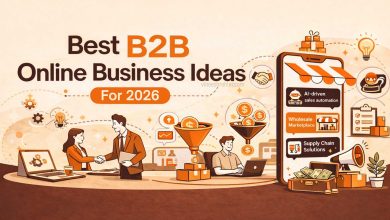Top 5 Online Business Ideas for Beginners : A Comprehensive Guide
Online Business Ideas for Beginners : The internet has transformed the business landscape, creating countless opportunities for individuals to start their own ventures without significant upfront costs. For beginners, online businesses are especially attractive because they often require minimal investment, allow for flexible working hours, and can be scaled as they grow. However, with so many options available, it can be challenging to decide where to start.
Table of Contents
In this essay, we’ll explore five online business ideas that are beginner-friendly, profitable, and adaptable to various skills and interests. Each idea is accompanied by tips, potential challenges, and ways to get started successfully.
1. Affiliate Marketing: Promoting Products and Earning Commissions

Affiliate marketing is one of the simplest ways to start an online business, making it perfect for beginners. It involves promoting products or services offered by other companies and earning a commission for each sale made through your referral.
How It Works:
- You sign up for an affiliate program offered by companies like Amazon, ShareASale, or ClickBank.
- You receive a unique affiliate link for the product or service you choose to promote.
- When someone clicks your link and makes a purchase, you earn a commission.
Why It’s Ideal for Beginners:
- Low Startup Cost: No need to create or stock products.
- Flexibility: Promote products in any niche that interests you, from tech gadgets to fitness gear.
- Scalable: As you grow your audience, your earning potential increases.
Steps to Get Started:
- Choose a Niche: Focus on a specific market, such as fashion, fitness, or tech, to target a defined audience.
- Build a Platform: Create a blog, YouTube channel, or social media presence to share content and promote affiliate products.
- Create Quality Content: Offer valuable insights, reviews, or tutorials to build trust and encourage purchases.
- Track Performance: Use tools like Google Analytics or affiliate dashboards to monitor your links and optimize your strategy.
Challenges:
- Requires consistent content creation.
- Building a loyal audience takes time.
- Commission rates may vary and can be low for some programs.
2. E-commerce: Selling Products Online
E-commerce has revolutionized retail, enabling individuals to sell products without the need for a physical store.
Buy Now : Ecommerce Website With 100 Products
With platforms like Shopify, Etsy, and Amazon, setting up an online store is easier than ever.
Types of E-commerce Businesses:
- Dropshipping: Partner with suppliers who handle inventory and shipping. You only need to manage the store and customer experience.
- Handmade Products: Sell unique, handcrafted items such as jewelry, candles, or artwork.
- Print-on-Demand: Create custom designs for T-shirts, mugs, or posters that are printed and shipped by a third-party service.
Why It’s Beginner-Friendly:
- Accessibility: Platforms like Shopify and Etsy provide user-friendly interfaces and tutorials.
- Low Investment: Dropshipping and print-on-demand eliminate the need for upfront inventory costs.
- Global Reach: The internet allows you to reach customers worldwide.
Steps to Start:
- Select a Niche: Identify a specific product category with demand, such as eco-friendly products or pet accessories.
- Choose a Platform: Set up a store on Shopify, Etsy, or Amazon.
- Market Your Store: Use social media, email marketing, and paid ads to attract customers.
- Optimize for Sales: Offer clear product descriptions, quality images, and competitive pricing.
Challenges:
- Intense competition requires strong branding and marketing efforts.
- Managing customer service and returns can be time-consuming.
- Success depends on the quality and demand for your products.
3. Content Creation: Monetizing Your Passion

Content creation involves producing and sharing valuable or entertaining material in the form of videos, blogs, or podcasts. As a content creator, you can generate income through ads, sponsorships, and merchandise.
Popular Platforms for Content Creators:
- YouTube: Share videos on topics like tutorials, vlogs, or product reviews.
- Blogs: Write articles about your interests, such as travel, finance, or cooking.
- Podcasts: Record audio content discussing topics of interest or interviewing guests.
Why It’s Great for Beginners:
- Creative Freedom: You can choose topics you’re passionate about.
- Multiple Monetization Streams: Earn through ads, affiliate marketing, and brand partnerships.
- Scalable Growth: Successful creators can grow into influencers with larger audiences.
How to Start:
- Pick Your Niche: Focus on a topic you love and have expertise in.
- Choose a Platform: Start a blog, YouTube channel, or podcast based on your preferred medium.
- Create Consistently: Post regularly to build an audience and establish credibility.
- Monetize Your Content: Use Google AdSense, sponsorship deals, or merchandise sales to generate income.
Challenges:
- Building an audience takes time and effort.
- Requires consistent creativity and quality.
- Monetization depends on reaching a significant following.
4. Online Courses or Coaching: Sharing Your Knowledge
If you have expertise in a particular field, creating online courses or offering coaching services can be a lucrative business. With platforms like Udemy, Teachable, and Zoom, you can reach learners worldwide.
Types of Courses and Coaching:
- Academic Subjects: Teach math, science, or languages.
- Skills Development: Offer courses on coding, graphic design, or marketing.
- Personal Development: Provide coaching for fitness, mindfulness, or career growth.
Why It’s a Good Option for Beginners:
- Low Overhead Costs: All you need is knowledge, a camera, and a platform to start.
- High Demand: The e-learning market is growing rapidly, creating ample opportunities.
- Passive Income Potential: Pre-recorded courses can generate income long after they’re created.
How to Start:
- Identify Your Expertise: Choose a topic you are skilled in and passionate about teaching.
- Create a Curriculum: Outline lessons and structure your content logically.
- Record and Edit Videos: Use tools like Canva, OBS Studio, or Camtasia to create polished course material.
- Host Your Course: Upload it to platforms like Udemy or teach live sessions via Zoom.
- Market Your Course: Use social media, email campaigns, and testimonials to attract students.
Challenges:
- Initial effort in creating course content can be time-intensive.
- Competition requires you to deliver high-quality and unique content.
- Success depends on your ability to market your course effectively.
5. Freelancing: Offering Your Skills as a Service
Freelancing involves providing services to clients on a project-by-project basis. This business model is ideal for individuals with skills in areas like writing, graphic design, web development, or social media management.
Popular Freelancing Platforms:
- Upwork: Ideal for finding clients in various fields.
- Fiverr: Great for offering quick, specialized services.
- Toptal: Focuses on connecting top talent with premium clients.
Why Freelancing Works for Beginners:
- Flexible Schedule: Work on your own terms and choose projects that interest you.
- No Overhead Costs: All you need is your skill and an internet connection.
- Diverse Opportunities: Freelancing caters to numerous industries and niches.
Steps to Start Freelancing:
- Identify Your Skills: Determine what services you can offer, such as writing, graphic design, or coding.
- Create a Portfolio: Showcase your work through a personal website or samples on freelancing platforms.
- Set Competitive Rates: Research industry standards to price your services appropriately.
- Bid on Projects: Use platforms like Upwork or Fiverr to connect with clients and secure projects.
- Deliver Quality Work: Build a reputation by meeting deadlines and exceeding client expectations.
Challenges:
- Income can be inconsistent initially.
- Finding clients may take time and effort.
- Managing multiple projects and deadlines can be stressful.
Online Business Ideas for Beginners – Conclusion

Starting an online business as a beginner is an exciting journey filled with opportunities. Whether you choose affiliate marketing, e-commerce, content creation, online courses, or freelancing, each path offers unique benefits and challenges. The key to success lies in identifying your strengths, staying consistent, and continuously learning.
Also Read : Top 5 Ecommerce Companies in India
While the initial stages may seem overwhelming, persistence and strategic planning will pay off in the long run. Embrace the digital world, leverage available tools, and take the first step towards creating a sustainable and profitable online business. The possibilities are endless for those willing to put in the effort and adapt to the evolving online landscape.
Keywords : Online Business Ideas for Beginners – Online Business Ideas for Beginners 2024 – Online Business Ideas for Beginners 2025



